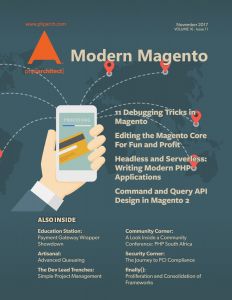11 Debugging Tricks in Magento
Like all frameworks, Magento has its own opinions and related architecture for how common tasks (e.g. handling user requests, building the user interface, etc.) are achieved. The most effective Magento developers have spent a lot of time stepping through the code, especially when developing customizations. This experience makes them familiar with how the framework carries out application tasks. This article provides a shortcut for gaining some of this knowledge, in order to follow best practices and quickly solve common issues encountered during development. by Sergii Kovalenko
Editing the Magento Core For Fun and Profit
One of the first things a new Magento developer learns is, “never edit the core.” Both Magento 1 and Magento 2 are designed to be easily upgradable, and a key component of this ability to upgrade is because there are a set of core files living under the Magento namespace which should never be edited. Let’s take a look at the value of contributing to the [Magento Core], how to go about contributing, who can contribute, and some recent contributions I’ve been involved with here at Creatuity. by Joshua Warren
Command and Query API Design in Magento 2
API design is an essential part of software development. Abstractions and extension points introduced for an application—and how they are organized and modularized in the codebase—directly impacts system maintainability and extensibility. In an application as robust as Magento 2, it was decided to introduce a layer of service contracts (public APIs) in the scope of each Bounded Context (in DDD terms). by Igor Miniailo
Headless and Serverless: Writing Modern PHP Applications
In this article, the place of PHP in the modern world will be analyzed, with the purpose of focusing on things which it is suited best for, implementing complex business rules of backend services. by Eugene Tulika
Education Station: Payment Gateway Wrapper Showdown
This month, I want to look at the exciting world of finances and payment gateways. I’m going to take you on a tour of two of the most significant payment libraries in PHP, Omnipay and Aktive Merchant. We’ll see the benefits of using a single library, even when different payment gateways provide their own PHP SDK. by Matthew Setter
Artisinal: Advanced Queueing
Last month we covered basic queueing and activities you would want to push a task to a queue system. This month, we’ll build on our previous example and demonstrate how to use multiple queues to send jobs as a higher priority by building a user notification job which will also cover injecting an Eloquent model into a job class. by Joe Ferguson
The Dev Lead Trenches: Simple Project Management
One of the hardest things I have had to do as a developer is figuring out what in the world I am supposed to be doing on projects. I do not mean from a code standpoint, like what framework I should be using, or even an architectural standpoint like what technologies I should be using. I mean sitting down at my desk and determining what I am supposed to be doing, today, to get to my goal of having a finished product. by Chris Tankersley
Security Corner: The Journey to PCI Compliance
Good developers strive for a high level of security within their applications. When these applications deal with payment information, the scope of security concerns grows dramatically. Several credit card companies have gathered together to standardize a set of guidelines applications should follow to better protect customers’ payment information from theft and abuse, PCI DSS. by Eric Mann
Community Corner: A Look Inside a Community Conference: PHP South Africa
This month, I’d like to focus on a community conference I was lucky enough to speak at recently. PHP South Africa took place at the end of September in Cape Town, in the heart of the busy Victoria and Alfred Waterfront tourist area by the seafront that overlooks Table Bay. by James Titcumb
finally{}: Proliferation and Consolidation of Frameworks
If you look at the JavaScript community at the moment, you will find an ecosystem that is exploding with constant innovation. New tools and new frameworks are being created so fast, that the community has begun to make fun of itself for it. It can attract younger programmers eager to be always on the cutting edge of technology, and it is something that PHP is missing at the moment. by Eli White






